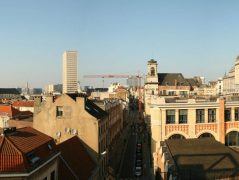
Brussels
Contents
1 Introduction2 Data and facts3 Administration4 Economy 5 Business Environment6 Infrastructure7 Technology8 Social Wellness and Human Resources9 ReferencesIntroduction
The Capital of Belgium is Brussels. It has the largest community with being named as the historic center. Brussels is well known for its biggest concert/ sport The King Baudouin stadium with a capacity of 50,000 seats. It is a member of the European Union and serves as the EU's de facto capital. The country covers 11,690 square miles of land.
As of 2016, it ranks as the 86th costliest city around the world. Belgium has sold out an estimated US$398 billion worth of commodities around the globe. Popular landmarks are the European Parliament, Royal Palace, Grand place square and the Town Hall.
Data and facts
- The national population of Brussels as on census taken in 2016 is 11.4 million.
- The Brussels-Capital region encompasses the City of Brussels with 18 additional municipalities. Population density within the city of Brussels is 14,200 per square miles.
- To celebrate the ascension of King Leopold 1, July 21 is declared as a public holiday.
- The political capital of Europe is Brussels wherein 40,000 employees and 4,000 NATO workers are employed by numerous firms.
- A major producer of beer, waffles, and chocolate, and more than 800 brands of beer operate in the city.
Administration
The administrative department of Brussels consists of 2 major parts: the Departments of structure and the Department of production.
The region is divided into 3 sections, including the Flemish Region and the Walloon region, with each further subdivided into 5 individual constituencies.
The Brussels region is ordained by executive and legislative committees. Every five years the Council of the Region appoints the executive branch, embodied with a number of executive officers, one of whom serves as minister-president.
Among its many capacities, the region has jurisdiction over land-use regulations, residence, road and waterway networks, regional public transit, vocational training and workers’, environmental protection, and cultural preservation.
Economy
The GDP of Brussels in 2017 was €77,694 million with per capita purchasing power standards (PPS) of €57,700 as in 2017. Around 19% of workers are from Flanders or Wallonia while 17% of the people are outsourced employees. Brussel's economy is highly service-oriented since it's the hub of the EU union.
The country has created 121,000 jobs with a great level of support for the entrepreneurship community. Some of the major companies are Toyota Motor, Volkswagen manufacturing unit, and DaimlerChrysler. The foremost sectors of production have been printing, electronics, chemicals, food industry, publishing, clothing, aircraft building, and the telecom department.
Business Environment
Brussels, like most places, has its own distinct work culture. Belgian companies often offer a wide range of benefits in addition to the basic salary. In Brussels, Statbel found that mostly 50% of employees earn more than 3,000 euros a month.
Belgium has always been known as an open nation. The country provides simplified work permit visa procedures for immigrants who want to work or start a business.
Infrastructure
Brussels features a large dedicated mobility infrastructure, comprising roads, squares, tunnels, bridges, and the metro lines. The different parts of this infrastructure are supervised by specific organizations based on location, purpose and the type of work needed. The primary organization includes Bruxelles Mobilité, the communal authorities and STIB (Société des Transports Intercommunaux de Bruxelles).
Technology
Being the central region of Belgium, Brussels is advanced in the science and technology domain. The European organization for the safety of air navigation called Eurocontrol headquarters in Haren, the city of Brussels.
It is home to several national science and technology institutes that are funded by the Flemish government, and students can pursue post-graduate programs with Dutch and English as language options.
Social Wellness and Human Resources
The main languages spoken are French, Dutch. In Belgium, education is mandatory up to 18 years of age that is split up into four categories. Brussels has an extensive education curriculum with insights into all network kinds and philosophical beliefs.
By law, all employees and self-employed people must contribute to an insurance fund for their healthcare system in Brussels as part of the formal social security enrolment system.
The Art Nouveau architects Henry van de Velde and Victor Horta and the Surrealist Paul Delvaux and René Magritte are the most influential figures. Brussels in the early 21st century stays as a cultural center with a cosmopolitan touch.
References
https://www.brussels.com/v/economy/
https://www.brussels.be/administrative-departments
https://en.m.wikipedia.org/wiki/City_of_Brussels
https://businessculture.org/western-europe/busines-in-belgium/
http://www.city-data.com/world-cities/Brussels-Introduction.html
https://hdi.globaldatalab.org/areadata/shdi/
https://web.archive.org/web/20151015203704/http://archive.pfwb.be/99180RBEI033858
http://news.bbc.co.uk/2/hi/europe/country_profiles/999709.stm
https://www.theguardian.com/business/2017/jun/13/brussels-euro-uk-brexit-eu-business
 Metricsbeta
Metricsbeta
- Anderlecht
- Auderghem/Oudergem
- Berchem-Sainte-Agathe / Sint-Agatha-Berchem
- City of Brussels
- Etterbeek
- Evere
- Forest / Vorst
- Ganshoren
- Ixelles / Elsene
- Jette
- Koekelberg
- Molenbeek-Saint-Jean / Sint-Jans-Molenbeek
- Saint-Gilles / Sint-Gillis
- Saint-Josse-ten-Noode / Sint-Joost-ten-Node
- Schaerbeek / Schaarbeek
- Uccle / Ukkel
- Watermael-Boitsfort / Watermaal-Bosvoorde
- Woluwe-Saint-Lambert / Sint-Lambrechts-Woluwe
- Woluwe-Saint-Pierre / Sint-Pieters-Woluwe